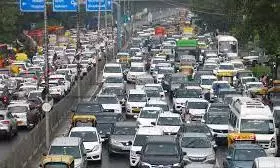
Delhi government urges SC to rethink blanket ban on older vehicles, seeks scientific evaluation
text_fieldsIn a significant legal move, the Delhi government has approached the Supreme Court, requesting a review of the ban on older diesel and petrol vehicles operating in the Delhi-NCR region.
The plea challenges the 2018 directive that restricts diesel vehicles older than 10 years and petrol vehicles over 15 years from plying on city roads.
Labeling the current regulation as overly broad and unfairly burdensome to middle-class citizens, the Delhi government has asked the apex court to direct either the Central government or the Commission for Air Quality Management (CAQM) to carry out a comprehensive scientific study.
The proposed study would evaluate the actual environmental impact of age-based restrictions and determine whether such a policy leads to measurable improvements in air quality across the National Capital Region (NCR). The government emphasised that the existing approach might not be the most effective or equitable way to address vehicular pollution.
"The current approach mandates collective compliance, without distinguishing between heavily polluting and well-maintained, low-use vehicles," the Delhi government's application noted. "This does not align with the broader objective of effectively reducing pollution levels in the region."
The plea calls for a shift toward an emission-based regulatory framework, arguing that decisions should focus on individual vehicle emissions and roadworthiness, not age alone. The application highlights that BS-6 vehicles—introduced as part of India’s stricter emissions standards—release far fewer pollutants than BS-4 vehicles, yet even some compliant vehicles are currently affected by the blanket ban.
It also points out that many of the impacted vehicles are well-maintained and used infrequently, contributing minimally to pollution levels. Citing available studies, the government argued that these low-usage vehicles have a negligible environmental footprint, making the policy disproportionate in its impact.






